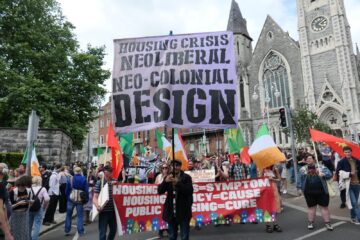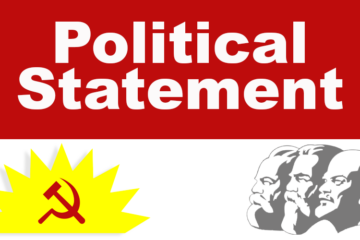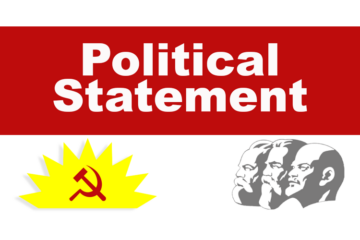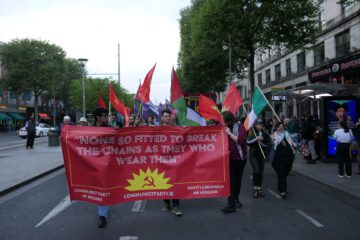National Executive Committee, Communist Party of Ireland
11 March 2017
The National Executive Committee of the Communist Party of Ireland, meeting over the weekend of 11 March, evaluated the political challenges facing the people at both the national and the international level at the present time.
The recent elections to the Belfast Assembly highlighted a number of features. Unionism lost ground, and we witnessed the near-collapse of the old Ulster Unionist Party, with the DUP losing seats but remaining the largest party and Sinn Féin significantly improving its position. Clearly “liberal” unionism is fragmenting, and a significant number have shifted to the Alliance Party. The DUP is no longer able to use the “petition of concern” that it has used time and again to block progressive legislative change, as in the case of marriage equality.
There was little progress in developing a progressive bloc of forces at this time. The election also saw Sinn Féin’s further retreat from its previous anti-EU policy. It is now further dressing up its position, even claiming that the EU could be the vehicle for bringing about national unity, arguing that this imperialist bloc is somehow more progressive than British imperialism.
The Irish government has also been attempting to hide its own impotence, using references to national unity and the defence of the Belfast Agreement to exaggerate its possible role and to express its concerns regarding the wider economic and political consequences flowing from Brexit. A misconception is being peddled by the Irish government that being part of the 27-member EU negotiating with the the British government will grant Ireland any meaningful influence over the working out of the final arrangement. In fact the interests of the Irish people, north and south, are peripheral to the negotiations between Britain and the EU.
Ireland’s working people, north and south, cannot afford to wait passively for the neo-liberals of the EU to impose their deal but must instead develop their own demands and fight for them in this situation, and do so in their own class interests.
It is crucial that alternative voices and demands are heard and presented. There is a need for working people to develop an alternative way forward, a strategy that puts working people’s interests first, a strategy that has the potential to unite people rather than deepen existing divisions or open up new ones.
Internationally, the situation continues to grow more unstable as the crisis of the system continues to deepen. Imperialism continues its violence and aggression against the people, destroying and blighting the lives of tens of millions of working people, destabilising whole regions in its global strategy of domination.
Donald Trump continues the same polices at the global level as his predecessors, while at home state pressure intensifies upon vulnerable migrant workers. Trump is merely more open and brutal in the expression of his policies. It is still not clear at this point to what extent there is a fissure or fracture within the ruling forces in the United States.
Some of these same tensions also lie at the heart of the Brexit vote in Britain. The European Union itself is showing increasing signs of crisis and confusion concerning the possible outcome of the British state leaving the EU. A political crisis is developing out of the growing economic and financial instability beginning to grip the core EU states.
The growth in the far right—the reserve army of imperialism—may well continue to develop as the dominant elements of the left throughout the EU continue to ignore the national democratic and sovereign demands sought by large sections of the European working class at the national level.
The party also evaluated the level of working-class militancy as expressed in the struggle of retail workers in Tesco and the public transport workers. It is clear that there is widespread support among working people for these groups of workers in their just struggle. This needs to be built upon and developed into a wider fight back. This public support was an essential factor in pushing the companies involved back to the negotiating table.
Employers and the state are continuing their offensive to break trade unions and trade unionism. This needs to be resisted not only by the trade unions involved but by the whole of the labour movement. It is also clear that the deregulation of transport is designed to break the transport workers and their trade union, to facilitate the race to the bottom in the terms and conditions of all transport workers.
The party publicly congratulates the mobilisation of women to mark and celebrate International Women’s Day and congratulates the role played by communist activists in the very successful week-long events in Belfast. The CPI also welcomes the great turn-out of thousands of mainly young women in Dublin and other towns and cities to demand the repeal of the 8th Amendment. There is now a clear coalition of democratic opinion that wishes to see the 8th Amendment removed from the constitution, and not some sort of amendment to the amendment.
The continuing exposure of the role played by both state and religious institutions in the wholesale abuse of women and children has shown, once again, the profundity of the words of James Connolly, that the partition of Ireland would lead to a carnival of reaction. It once again exposes the war of the church and state against the poor, at the bidding of the ruling class, to intimidate and discipline the working class.
The party endorses the call for the maximum mobilisation of workers on Saturday 8 April to push forward their demand regarding water charges and the demand for a constitutional amendment to ensure the people’s ownership of their water resources. We need to keep up the pressure to ensure that there is no retreat in this struggle.
The party calls upon its members and supporters to actively promote and encourage working people to attend the forthcoming series of national public meetings on the theme “Brexit: A view from the left,” with comrades from the Communist Party of Britain taking part in this crucial and central debate.









